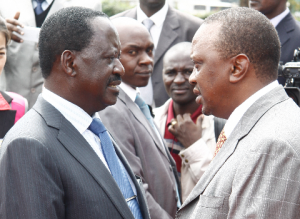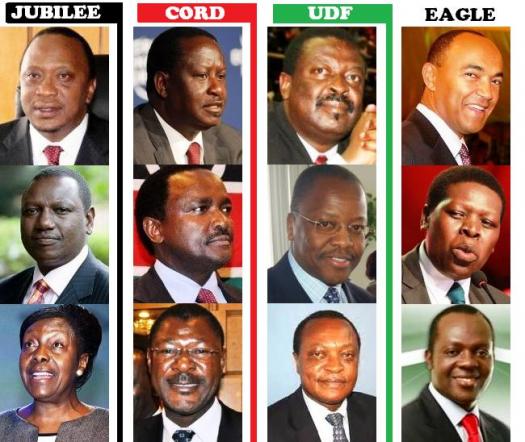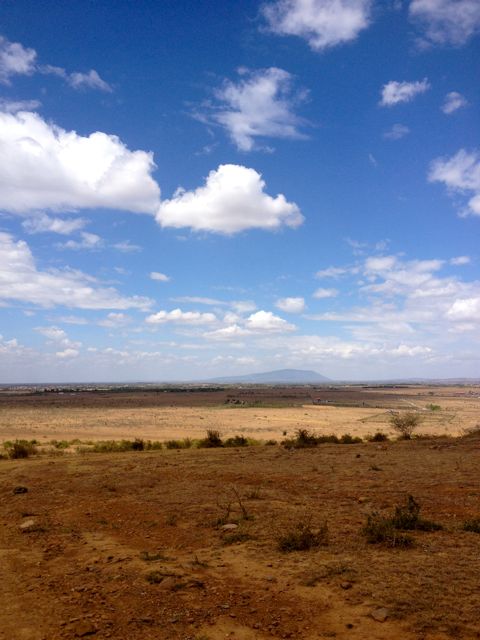On March 4th Kenyan, which typically has voter turnouts rates of 70%, will elect their first president under the new constitution they adopted on August 27 2010, applauded as one of the most progressive constitutions in place today.
Kenya is an important US alley in the war against terror, a regional power that encourages stability with tenuous neighbors such as Somalia that sent troops to the country to pacify the threat of Al-Qaida affiliated Al-Shaabab.
The election pits two candidates representative of the countries oldest political rivalry. The son of the Republic’s first president, Uhuru Kenyatta is running under the Jubilee Coalition son of the country’s first vice president, Raila Odinga on the Cord Coalition. A dozen fringe party candidates are polling cumulatively at less than 10%.
Kenya is still recovering from the last time it went to the polls. During the 2007 elections, the incumbent president Kibaki was declared the winner over the opposition leader Raila by a slim margin amid widespread reports of rigging—he was sworn in at night at a closed door ceremony while the country erupted in what was dubbed the 2007/2008 Post Election Violence in which 1,500 Kenyans lost their life and 600,000 were displaced by ethnic clashes.
 Both Uhuru and is running mate William Ruto are indicted of crimes against humanity charges in the International Criminal Court and subject to appear on April 11for their role in stirring tensions Kiambaa Church Incident in which people, including women and children were burnt to death.
Both Uhuru and is running mate William Ruto are indicted of crimes against humanity charges in the International Criminal Court and subject to appear on April 11for their role in stirring tensions Kiambaa Church Incident in which people, including women and children were burnt to death.
With the election fast approaching polls are showing a dead heat for both candidates. Representatives of Western governments have come as close as foreign diplomats can come to endorsing a candidate.
On February 7th, Barack Obama delivered a video statement to the nation saying “The choice of who will lead Kenya is up to the Kenyan people. The United States does not endorse any candidate for office, but we do support a peaceful elections.”
Two days later the President’s top diplomat in Africa, US Assistant Secretary of State for African Affairs Johnie Carson, went further saying, “Individuals have histories. Individuals are known for who they are. . . choices matter and they have consequences. ”
Carson’s statement has widely been seen as a caution against electing a president who will spend much of his term split between matters of the state and defending himself against international charges of crimes against humanity.
European diplomats have taken a firmer stance against an Uhuru victory. British High Commissioner Christian Turen told Citizen TV “The policy of my government remains that we do not have contact with ICC inductees unless it is essential.” French ambassador Etienne de Poncin echoed those sentiments saying that while Kenyans have a right to elect leaders of their choice, “Our position is that we only have essential contact with somebody who is indicted by the ICC; it is a well-known position, same as the British.”
Polls rank The Land Issue as the most important topic of the election. Most people depend on land for their livelihood. In a public statement Raila says, “I cannot stop talking about land because it will never be resolved unless a President with the political will to resolve it is elected.”
The constitution enacted after British rule was amended to the point of creating quasi dictatorship with unchecked executive powers, which resulted in the elite grabbing land, and using their position to improve their lot while leaving the rest of the country in the cold.
Raili is seen by the international community as a candidate who will be more capable of addressing the issue. Uhuru owns vast expanses of contested land that was grabbed by his father during his presidency. He has accused the opposition of “hate speech” when asked to demonstrate how his land was acquired. He says, “If politicians continue to throw cheap shots at each other to distract from real issues, effective land reform will never materialize.”
An indicator the general elections, the January 17th primaries, does not foretell a smooth election. They were wrought with chaos, confusion and irregularities. Kipkoech Tanui, managing editor of the national paper The Standard wrote, “January 17th will be remembered as the lowest point of democracy and the bell tolled on the principle of free and fair conduct.”
Another national paper called them a “monumental shame”“ and a “charade” that “cast doubts on whether parties can still be trusted as the bastions of democracy.”
With the new constitution ushering in dramatic changes to how politics in the country operate, Kenya is undergoing significant change. The local media is sometimes optimistic about the prospect of a freer democratic society and also wary of a return to the violence it saw last time around. All that is certain is that the region and world will be watching when Kenyans go to the polls.





